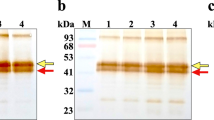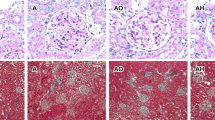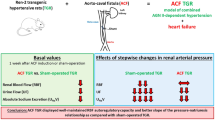Abstract
CHANGES in the activity of enzymes which destroy angiotensin may be concerned in the development of hypertension, but many relevant studies have involved tissue homogenates1–7 which may not reflect accurately the capacity of intact organs to remove circulating angiotensin. Intracellular enzymes, that normally have limited or no access to perfusing blood, are released when tissue extracts are prepared. Others8–11, however, recognizing this problem, investigated angiotensin inactivation by perfused organs in vivo, and demonstrated the dominant role of organ vascular beds in the inactivation of angiotensin in rats and dogs and the relative unimportance of circulating angiotensinases. A tentative explanation is that tissue enzymes are involved rather than storage of angiotensin at receptor sites (results of W. P. L., J. G. L. and J. W. Ryan, unpublished).
This is a preview of subscription content, access via your institution
Access options
Subscribe to this journal
Receive 51 print issues and online access
$199.00 per year
only $3.90 per issue
Buy this article
- Purchase on Springer Link
- Instant access to full article PDF
Prices may be subject to local taxes which are calculated during checkout
Similar content being viewed by others
References
Dexter, L., Ann. Int. Med., 17, 447 (1942).
Bing, J., Acta Path. Microbiol. Scand., 56, 385 (1962).
Hickler, R. B., Lauler, D. P., and Thorn, G. W., J. Clin. Invest., 42, 635 (1963).
Lagrue, G., and Meyer, P., Path. Biol., 11, 895 (1963).
Biron, P., Landesman, R., and Hunt, J. C., Nature, 204, 1096 (1964).
Birbari, A. E., and Hickler, R. B., Circulation Suppl., Nos. 31–32, 2, 50 (1965).
Itskovitz, H. D., Dudrick, S. J., and Dyrda, I., Arch. Int. Med., 119, 241 (1967).
Hodge, R. L., Ng, K. K. F., and Vane, J. R., Nature, 215, 138 (1967).
Bakhle, Y. S., Reynard, A. M., and Vane, J. R., Nature, 222, 956 (1969).
Biron, P., Meyer, P., and Panisset, J. C., Canad. J. Physiol. Pharmacol., 46, 175 (1968).
Leary, W. P., and Ledingham, J. G., Nature, 222, 959 (1969).
Leary, W. P., Ledingham, J. G., and Woods, H. F., Abst. Fourth Intern. Cong. on Nephrology, Stockholm, 1, 192 (1969).
Leary, W. P., and Ledingham, J. G., Clin. Sci., 38, 573 (1970).
Leary, W. P., thesis (Univ. of Oxford, 1969).
Khairallah, P. A., and Page, I. H., Biochem. Med., 1, 1 (1967).
Regoli, D., Riniker, B., and Brunner, H., Biochem. Pharmacol., 12, 637 (1963).
Author information
Authors and Affiliations
Rights and permissions
About this article
Cite this article
LEARY, W., LEDINGHAM, J. Inactivation of Angiotensin II Analogues by Isolated Perfused Rat Liver and Kidney. Nature 227, 178–179 (1970). https://doi.org/10.1038/227178a0
Received:
Issue Date:
DOI: https://doi.org/10.1038/227178a0
This article is cited by
Comments
By submitting a comment you agree to abide by our Terms and Community Guidelines. If you find something abusive or that does not comply with our terms or guidelines please flag it as inappropriate.



